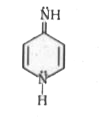The compound which gives propane on reduction with Zn and dilute hydrochloric acid is
CH3CH2CH2OH
CH3CH=CH2
CH - C -= CH
CH3CH2CH2−Cl
The correct Answer is:D
To solve the question, we need to identify which compound, when reduced with zinc and dilute hydrochloric acid (HCl), yields propane (C3H8).
1. Understanding the Reaction:
The reduction of alkyl halides (R-X) with zinc and dilute HCl typically results in the formation of the corresponding alkane (R-H) and hydrogen halide (HX). The general reaction can be represented as:
R−X+Zn+HCl→R−H+ZnX+H2
where R is the alkyl group and X is the halogen.
2. Identifying the Compounds:
We have four options:
- a) Propanol (C3H8O)
- b) Propene (C3H6)
- c) Propyne (C3H4)
- d) 1-Chloropropane (C3H7Cl)
3. Analyzing Each Compound:
- Propanol: This is an alcohol and does not contain a halogen. It cannot be reduced to propane using zinc and dilute HCl.
- Propene: This is an alkene and also does not contain a halogen. It cannot be reduced to propane using zinc and dilute HCl.
- Propyne: This is an alkyne and does not contain a halogen. It cannot be reduced to propane using zinc and dilute HCl.
- 1-Chloropropane: This is an alkyl halide. When reduced with zinc and dilute HCl, it will yield propane.
4. Performing the Reduction:
For 1-chloropropane (C3H7Cl):
C3H7Cl+Zn+HCl→C3H8+ZnCl2
This reaction shows that 1-chloropropane will yield propane (C3H8) upon reduction.
5. Conclusion:
The compound that gives propane on reduction with zinc and dilute hydrochloric acid is 1-chloropropane.
Final Answer:
The correct option is d) 1-Chloropropane.
The reduction of alkyl halides (R-X) with zinc and dilute HCl typically results in the formation of the corresponding alkane (R-H) and hydrogen halide (HX). The general reaction can be represented as:
R−X+Zn+HCl→R−H+ZnX+H2
where R is the alkyl group and X is the halogen.
We have four options:
- a) Propanol (C3H8O)
- b) Propene (C3H6)
- c) Propyne (C3H4)
- d) 1-Chloropropane (C3H7Cl)
- Propanol: This is an alcohol and does not contain a halogen. It cannot be reduced to propane using zinc and dilute HCl.
- Propene: This is an alkene and also does not contain a halogen. It cannot be reduced to propane using zinc and dilute HCl.
- Propyne: This is an alkyne and does not contain a halogen. It cannot be reduced to propane using zinc and dilute HCl.
- 1-Chloropropane: This is an alkyl halide. When reduced with zinc and dilute HCl, it will yield propane.
For 1-chloropropane (C3H7Cl):
C3H7Cl+Zn+HCl→C3H8+ZnCl2
This reaction shows that 1-chloropropane will yield propane (C3H8) upon reduction.
The compound that gives propane on reduction with zinc and dilute hydrochloric acid is 1-chloropropane.
The correct option is d) 1-Chloropropane.
Topper's Solved these Questions
Similar Questions
Knowledge Check
The most reactive amine towards dilute hydrochloric acid is ______
A B
B C
C D
D
The compound which gives H2O2 on treatment with dilute acid is
View SolutionWrite the reaction of zinc oxide with dilute hydrochloric acid.
View SolutionWhich gas is released when Potassium reacts with dilute hydrochloric acid?
View SolutionWhat happens if bone of frog is kept is dilute hydrochloric acid:
View SolutionState your observation when:
Dilute hydrochloric acid is added to MnO2
View SolutionGive reason for the following:
Potassium and sodium are not used for reaction with dilute hydrochloric acid or dilute sulphuric acid in laboratory preparation of hydrogen.
View SolutionWhich of the following metals will not react dilute hydrochloric acid?
View Solution
